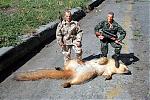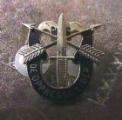Two insurgencies, actually... the one in Central/Western Mindanao really doesn't derive from "the relationship between the peasants, the elite and the military" and has fundamentally different causative factors.
The assumption that all derives from governance can obscure the reality that governance and patterns of governance often derive themselves from culture and history. When incompatible populations are combined by quirks of post-colonial borders into "nations" with implicit potential for conflict, it's only natural for governance to reflect the inherent conflicts. Of course in theory you could expect governments to transcend these issues, but in reality governments reflect these implicit divisions and it's not realistic to expect them to do otherwise.
The "governance-centric" approach, whether in Afghanistan or elsewhere, has virtues and does help to understand why insurgency emerges. The risk, of course, is that from the conclusion that all emanates from governance, we may deduce a need to run around changing the way other countries are governed, which is likely to get us into an even deeper pile of scheisse. Understanding the role that governance plays in generating insurgency has to be matched by an understanding of the challenges and general undesirability of attempts to dictate, impose, or attempt to generate changes in the way other nations are governed.














Bookmarks